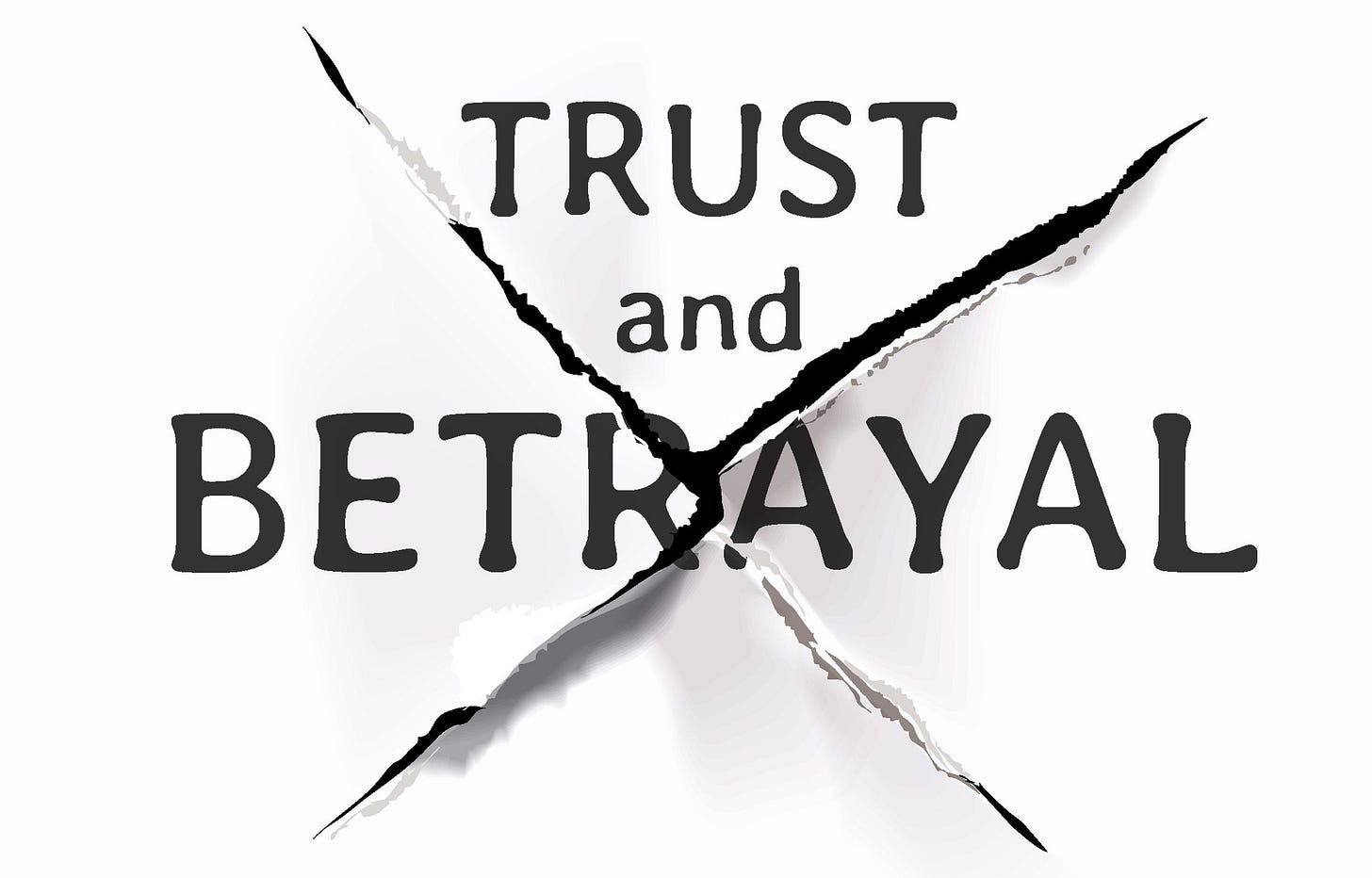E-Pluribus | November 7, 2023
The left and the Jewish community; parental rights and parental wrongs; getting rid of bad laws.
A round-up of the latest and best musings on the rise of illiberalism in the public discourse:
Suzy Weiss and Francesca Block: The Great Betrayal
The left prides itself on standing up for the oppressed. But some on the left have been shocked to find out that Jews apparently don’t qualify as victims, write Suzy Weiss and Francesca Block at The Free Press. Intersectionality only goes so far, and many Jews are feeling like they are stuck on a one-way street to nowhere.
The Jewish progressives The Free Press spoke to said they no longer believe in a left that sees their own people’s plight. They feel torn: they don’t want to give up on the progressive causes they’ve marched for and believe in. But groups like Jews for Racial and Economic Justice and Jewish Voice for Peace don’t speak for them, and they don’t feel kinship with Israel’s allies on the right—like evangelical Christians and social conservatives.
“When you look at the political right you see a group that seems very comfortable with Jews in Israel and very uncomfortable with Jews at home. And when you look at the political left, you see a group that seems very comfortable with Jews at home and very uncomfortable with Jews in Israel,” Clark said.
Amelia Adams, 26, a writer and comedian in New York, told me she first noticed Jewish suffering being downplayed in May 2021, during the last bout of violence between Hamas and Israel. She called it “the start of the gaslighting.”
Now, she said, it’s at another level. “People who have a lot of friends in the gay community and the trans community are like, ‘Are you kidding me?’ It’s hit LGBT Jews really hard. It’s like, ‘Where do we go from here?’ ”
Jack Hazan, a therapist in New York, agrees. He’s been hosting virtual group therapy sessions for Jews in the wake of the massacre. “I have clients in tears over this; we spend the entire session talking about it,” he says. A theme that’s come up again and again is betrayal, by best friends who parrot lines like “Israelis are guilty of settler colonialism,” or committing genocide.
He says there’s an element of shock among the many other Jewish people he counsels.
“You’re mourning the loss of who you thought was this confidant and friend, but what makes it doubly sad is that you feel the world is turned on you.”
So why does he think the left has turned on its own people?
“It’s not based on values or beliefs,” he replies, adding that the left’s view on Israel is part of a set of ideological platforms they can’t break from.
“Therefore,” he says, adopting the thinking of the progressive left: “I have to stick to my guns even though, you know, it seems a little crazy that a ninety-year-old woman is being escorted out of a tunnel, but it must not be that bad and there are two sides to the story.”
He concludes: “It’s totally sick.”
Read it all here.
Robert Tracinski: When “Liberty” Means Censorship
Parents should have significant control over their children’s education—end of story. However, Moms for Liberty goes beyond the pale, Robert Tracinski writes at Persuasion.
The origin of Moms for Liberty was not in the culture wars over race and gender, but in the Covid culture war. It began in Florida as a rebellion against rules requiring masks for public school students. When Tina Descovich, the group’s co-founder, lost her bid for reelection to the Brevard County School Board in 2020, she joined Tiffany Justice, a former school board member from a neighboring county, to start an activist organization with the purpose of opposing pandemic measures in schools. In early 2021, they formed Moms for Liberty.
It was the pandemic that provided Moms for Liberty with the opportunity to mobilize and radicalize conservative parents. As Descovich explained, “If you miss this opportunity, when [parents] are really engaged … it’s going to be hard to engage them in the future.” When the debate shifted from masks to vaccines, Moms for Liberty appealed to anti-vaccine sentiment on the right. A new chapter in Orange County, California was launched toward the end of the movement’s first year and cited the state’s vaccine mandate as a reason for the chapter’s creation. Anti-vax crusader Robert F. Kennedy, Jr. was scheduled to be a star speaker at the Moms for Liberty national summit earlier this year before backing out at the last minute.
[. . .]
The big Moms for Liberty demand came in the form of a letter from Williamson County chapter chair Robin Steenman demanding the removal of books from the public school curriculum and changes to the manual given to teachers to accompany these readings. What are these objectionable books? They include Ruby Bridges Goes to School: My True Story—the story of the first black girl to attend a newly integrated school in Louisiana. Among the complaints about the book is that it shows Norman Rockwell’s famous depiction of Bridges in his painting “The Problem We All Live With.”
That’s right: Norman Rockwell is too subversive for Moms for Liberty.
[. . .]
The upshot of the Moms for Liberty approach is to impose a heckler’s veto that empowers the most paranoid and hypersensitive. The group slammed a video about seahorses, where the male actually does carry the eggs until they hatch, as an attempt to “normalize” the notion “that males can get pregnant” and “suggest that gender is fluid.” A picture book about African-American tap-dancing pioneer Bill “Bojangles” Robinson was denounced as “Critical Race Theory” for referring to the realities of racial prejudice and segregation in the early 20th century. A book on Galileo, the 17th century Florentine who was tortured for promoting his scientific discoveries, was denounced because it makes the Catholic Church look bad and therefore “makes kids question tradition.” The levels of irony are very thick here.
Rather than producing more parental engagement with the schools, Moms for Liberty’s national culture-war approach serves as a substitute for such engagement. Welch mentioned that the complaints he heard in Williamson County often came from people who don’t have kids in the public schools, or who had never been engaged in their schools or districts before. They are the kind of people, as he put it, who “ask none of the questions but have all of the answers.”
Read it all.
Matt Mitchell: What We Can Learn From Efforts to Repeal Bad Laws
Legislatures exist to pass laws, but repealing bad laws can be just as important to keeping a society free. Writing at Discourse Magazine, Matt Mitchell reviews some recent successes and enumerates how to replicate them in other areas where work is needed.
Still, as I pointed out earlier, there has been a growing and successful effort in many states to eliminate these [bad] laws, a movement that can teach us some valuable things going forward. With that in mind, here are five lessons:
First, reformers should “strike while the iron is hot.” When Congress withdrew its support for CON laws in 1986, 11 states immediately eliminated their CON programs. Some even did away with the laws in anticipation of congressional action. At no other time were so many CON programs eliminated or pared back. Those who delayed just gave special interests more time to organize.
Second, if the iron is not hot, reformers should settle in for a multiyear legislative campaign. The most recent CON reform efforts, such as repeals in Florida in 2019 and in South Carolina in 2023, took several years to come to fruition.
Third, crises can be a catalyst for change. When COVID hit, many policymakers were shocked to learn that their states made it illegal for hospitals to add beds without obtaining a CON. About two dozen states temporarily relaxed or suspended their CON requirements and, in many of these states, permanent repeal efforts gained momentum. It also helped that researchers found that those states that relaxed their programs had lower mortality rates.
Fourth, the most successful efforts marshaled a broad coalition of stakeholders, including patients, payors, doctors, researchers and device makers. On their own, each of these groups would have been outmaneuvered by the hospital associations that want to keep CON laws in place. But in Florida, South Carolina and elsewhere, they all spoke up against CON laws and found greater effectiveness in numbers.
Read the whole thing.
Around Twitter (X)
Wesley Yang has some thoughts on pseudo scholars and “the right reason to cancel people” (you might need to read it a few times to process it). Colin Wright chimes in, too:
Bari Weiss (via KC Johnson) connects the dots between the DEI mentality and the lack of empathy for Jews in the wake of the Hamas attack on Israel and concurrent spike in antisemitism:
And finally, presented without comment:










